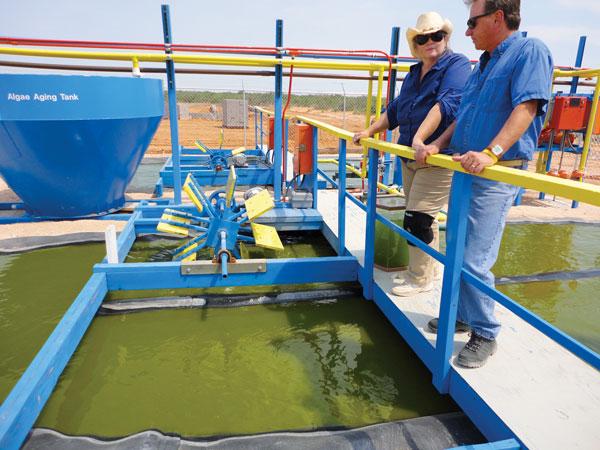Robert Hayes, Hobbs News-Sun. October 14th, 2012.
With the new Eldorado Biofuels facility built down by Jal, I found some interesting information to share. Although the green slime in a swimming pool is surely a nasty sight (particularly if it is in an area with mosquitoes), the algae is actually a plant, or at least many little microscopic algae plants.
Algae can be found in many forms including multicellular forms (common seaweed) and can grow in salt water such as that found in the ocean.
Like trees and other plants, algae are largely composed of cellulose and similar organic matter. This means that after it dies, its remains could either be burned or allowed to biodegrade like any other plant. More commonly in nature, algae are a form of food for other living things higher up the food chain. This is because like other plants, the algae concentrate carbohydrates into their cells which can serve as a source of food and nutrients for other life forms. A good example of saltwater algae serving as a nutritious food source is that of plankton because plankton is a major food source for many whales and other sea creatures.
As a plant, algae need sun, water, carbon dioxide and nutrients (dissolved minerals) to grow. The water can be fresh or salt water depending on the type of algae cells. Like other plants, algae convert carbon dioxide (CO2) into regular oxygen (O2). It is this regular O2 which mammals like us require to breath. They do this through a process called photosynthesis (although some can eat other organisms for energy). In photosynthesis, the carbon from the CO2 is broken down chemically (using energy from the sun) to build carbohydrates (such as sugars and starches). The photosynthesis enables the algae plants to convert the electromagnetic energy of the suns light rays into chemical energy in the form of cellulose, carbohydrates, starches and oil (depending on the type of algae).
There is a special type of algae that stores its energy in the form of oil, these are known as the diatoms. This particular type has cell walls made of pectin and silica and has been known to be rather toxic if ingested (due to the algae diatoms production of domoic acid as another byproduct in addition to oil). In addition to this, the silica in diatoms adds ash to the fuel conversion processes of Eldorado fuels (the Jal facility) so they work to keep them out of the bacteria culture as much as possible
A commercial production plant for algae would attempt to farm the algae like a continual algal bloom where the correct conditions of high CO2 content, water nutrients and sunlight would cause the algae to flourish. In principle, this biodiesel can be directly mixed with common fossil fuels or even find use in some modern engines with some chemical treatment.
The biggest hurdle with automobile engines comes with being able to construct a proper fuel, air, heat mixture in the piston at the time of ignition to insure complete combustion of the fuel at the right time. If you don’t have enough of any of these 3 ingredients, this can cause the mixture not to ignite (or ignite too soon) and so not burn properly or simply to behave differently as the car warms up (if any readers remember what engine knocking was back when leaded fuel was first introduced). Getting the right mix can be pretty important.
Initial estimates say that algae can produce around 40 times more energy per acre than corn and can yield more than 20 percent of their weight in oil. By utilizing land not considered appropriate for farming or other useful purposes, such a farm could use waste emissions from other commercial facilities (in terms of the CO2 emissions and/or brackish waste water) and run these through an algae farm converting it back into breathable oxygen and possibly useful oil. This certainly sounds like an excellent mix into an energy portfolio that our society is earnestly searching for. This because many people see undue risk in being critically dependent on any one fuel source which if compromised could be crippling to our economy and way of life.
What future difficulties lay ahead for algae biofules (if any) remain to be seen as this technology is in its infancy but certainly does appear to offer a bright promise for the kinds of alternative fuel supply’s our nation is searching for.
Robert Hayes of Hobbs is a licensed professional engineer in nuclear engineering in New Mexico, a certified health physicist by the American Board of Health Physics and has a Ph.D. in nuclear engineering and a masters degree in physics.
[gview file=”HobbsNewsSun10142012_Business.pdf”]

